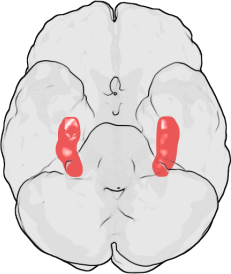When we recall an event, the brain automatically also calls up the nerve cells storing where the event took place, helping us to place our memories in space and time, new research using  human subjects has revealed.
human subjects has revealed.
This rare insight into the human memory system was obtained by Drexel University, Philadelphia, scientist Jonathan Miller and his colleagues.
Working with epileptic patients into whom brain electrodes had been inserted to study and treat seizures, the researchers were able to make recordings of nerve cell activity in the brain's hippocampus, a region in the temporal lobes known to be involved in learning, memory and navigation.
The patients were asked to play a computer game in which they had to find their way around a virtual world, delivering specific objects to certain addresses in that world.
First the patients learned their way around the game environment, then they began practising delivering the objects to the correct locations. As they were doing so, the researchers were recording flurries of activity in their hippocampi corresponding to specific groups of nerve cells selectively firing off when the subjects were in certain parts of the game map.
Next, the participants were presented with a blank screen and asked to recall, verbally, as many of the objects, in any order, they had delivered.
Intriguingly, they all tended to consecutively remember objects that were delivered to addresses that were closest to each other in the game.
Even more impressive was that the researchers also found that, when the subjects were recalling the objects they had delivered, the nerve cells in their brains that had fired maximally when they were in a certain location within the game map showed the same pattern of firing when the object delivered there was recalled.
"Thus," say the scientists in their paper in Science where the work is published, "recalling an episodic memory involves recovery of its spatial context."
This implies, they go on to say, that recalled memories are bound to their spatial contexts. It also shows why, when you can't remember what you went into the bedroom for, going back to the kitchen, where you first had the idea, is the best way to remember it!










Comments
Add a comment